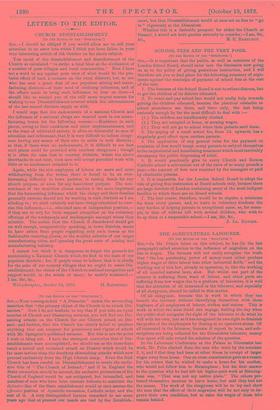LETTERS TO THE EDITOR.
CHURCH DISESTABLISHMENT.
[TO THE EDITOR OF THE "spacrnami
should be obliged if you would allow me to call your attention to an error into which I think you have fallen in your very interesting article of 5th October on the above subject.
You speak of the disestablishment and clisendowment of the Church as calculated "to strike a fatal blow at the civilisation of a number of poor villages and rural communities." Now I have not a word to say against your view of what would be the pro- bable effect of such a measure on the rural districts, but, as one who has seen a great deal of our populous mining and manu- facturing districts—of their need of civilising influences, and of the efforts made to bring such influences to bear on them—I should like to remind you of the still more urgent reasons for wishing to see Disestablishment averted which the circumstances of the last-named districts supply us with.
I would urge that the endowments of a national Church and the influence of a national clergy are wanted most in our manu- facturing towns for the following reasons :—Residence in such places, owing to their smokiness and other unpleasantnesses, and to the want of cultivated society, is often so distasteful to men of education and refinement, that it is very difficult to induce clergy- men having any means of their own to settle in such districts ; so that, if there were no endowments, it is difficult to see how such places could be provided with resident clergymen ; though it is often the case that in country districts, where the above drawbacks do not exist, such men will accept parochial work with little or no emolument attached to it.
Again, while the rich employers of labour are more and more withdrawing from the towns, there is found to be an ever- increasing difficulty in town parishes in raising funds for any church purpose, or even for any benevolent purpose. The non- residence of the wealthier classes renders it the more important that the humanising influence which the clergy and their families generally exercise should not be wanting in such districts as I am alluding to ; we shall certainly not have clergy calculated to exer- cise this influence,—i.e., educated men of independent position,— if they are to rely for their support altogether on the voluntary offerings of the workpeople and tradespeople amongst whom they minister. The notion that the Church if disendowed would get on well enough, comparatively speaking, in town districts, seems to have arisen from people regarding only such towns as the fashionable watering-places, or the wealthy suburbs of our larger manufacturing cities, and ignoring the great seats of mining and manufacturing industry.
I cannot but think it is dangerous to forget the grounds for maintaining a National Church which _we find in the state of our populous districts ; for, if people come to believe that it is chiefly for the sake of our country villages that we ought to resist Dis- establishment, the claims of the Church to national recognition and support would, in the minds of many, be unduly weakened.—
I am, Sir, &c.,
Wolverhampton, October 10, 1872. H. SANDFORD.


































 Previous page
Previous page